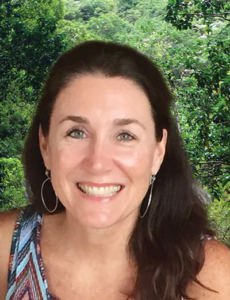By Stan Paul
Susan Lares-Nakaoka is no stranger to UCLA or UCLA Luskin.
The holder of multiple degrees from UCLA, including an MSW and a UP PhD, Lares-Nakaoka was hired to fill the key program position formerly held by Gerry Laviña, who recently retired after a long tenure as director of field education.
Lares-Nakaoka’s most recent teaching post was at Cal State Long Beach as an assistant professor. She is excited about her return to the Westwood campus. “It has been such a big part of my life,” she said.
Three other new Social Welfare faculty additions are Tatiana Londoño, an assistant professor, and Erin Nakamura, a member of the field faculty, both of whom started in the fall, and Bianca Wilson, who came aboard as an associate professor in January.
Like Lares-Nakaoka, Nakamura and Wilson have previous ties to UCLA. Nakamura is a 2012 graduate of Luskin’s MSW program, and Wilson had been working at UCLA’s Williams Institute. Londoño comes to UCLA Luskin from the University of Texas at Austin, where she recently completed her PhD in social work. She also holds an MSSW from UT.
These faculty additions “bring a wealth of knowledge and experience and will certainly be an asset to our department and a great resource for our students,” said Laura Abrams, professor and chair of UCLA Luskin Social Welfare.
Lares-Nakaoka, who also held acaemic posts at the University of Hawaii, Cal State Sacramento and Cal State Dominguez Hills, focuses her research and writing on the intersection of race and community development, critical race pedagogy, and Asian American and Pacific Islander communities. She is lead author on a forthcoming book, “Critical Race Theory in Social Work,” as well as editor of an upcoming special issue on race and social justice in the Journal of Community Practice. She is also co-founder and co-director of the Critical Race Scholars in Social Work (CRSSW) collective.
She said her experience as director of field education at Cal State Dominguez Hills, which was a pioneer in teaching social work from a critical race theory perspective, was foundational to her approach to social work pedagogy.
“My area of interest is in racial justice issues, so I’m interested in seeing ways in which we can make a bigger impact in the L.A. area in terms of what can social work look like that has this lens of racial justice and anti-racism.”
Lares-Nakaoka believes that UCLA is poised to be a leader in this area.
“In L.A., it’s so appropriate with our diversity and history, of both successes and failures, in areas of racial justice,” she said. “It’s just such an opportunity for me to be at UCLA, where the nation’s experts on critical race theory reside.”
Nakamura, a licensed clinical social worker (LCSW), is working as a field liaison in a position partly funded through a grant from the California Department of Health Care Access (HCAI) to expand social welfare education at UCLA.
“Through the HCAI grant, I will be working to increase access to culturally and linguistically relevant behavioral health services for children, adults, and families in un- and underserved communities,” she said.
Nakamura said she also will work to promote a diverse and competent workforce through MSW student recruitment, development of behavioral health internship sites, specialized clinical trainings, and coursework that emphasizes cultural humility and competence, as well as accessible mentorship and support to students as they work toward clinical licensure.
“I’ll be also working in the community with the different behavioral health agencies that we’re going to be partnering with, so kind of the perfect integration of this micro and macro social work practice that I love,” Nakamura said.
She has previous experience as a field instructor and in teaching roles at universities, including at UCLA. Nakamura is teaching behavioral health courses and also maintains a private practice.
Nakamura described her return to campus as an amazing experience.
“I look forward to taking on this new role because the people who I sought out as field faculty when I was a student — they shaped my entire career and my life,” she said. “It feels very full circle to be working alongside those same individuals.”
Londoño, who is originally from Colombia and was raised in Miami, focuses on the mental health and psychosocial well-being of Latine/x immigrant youth and their families.
Londoño is currently involved in several studies funded by the National Institutes of Health (NIH). A research emphasis on migration includes looking at how immigrant youth and families navigate and adapt to the psychosocial consequences of migration and resettlement. She is particularly interested in how immigration enforcement and practices in the U.S. play a role in their well-being.
“Something that’s really central to my work is being community-based,” said Londoño, who has conducted needs assessment and evaluation research related to study participants. “So, I will definitely be reaching out to organizations here working with immigrant and Latinx communities and slowly building those relationships.”
Joining Nakamura, Lares-Nakaoka and Londoño in January is Wilson, who holds master’s and PhD degrees — with a minor in statistics, methods and measurement — in psychology from the University of Illinois at Chicago. Her research focuses on system-involved LGBTQ+ youth, LGBTQ+ poverty and sexual health among queer women.
“I’m looking forward to continuing in an interdisciplinary department, but now with a broad range of research topics,” she said. “This can create opportunities for collaboration but also for learning about the many areas of work I don’t focus on.”
In addition to being the Rabbi Zacky Senior Scholar of Public Policy at UCLA’s Williams Institute, as well as a researcher and senior scholar of public policy since 2011, Wilson has been a faculty affiliate at the UCLA California Center for Population Research since 2014. At UCLA Luskin, Wilson will focus on Social Welfare’s concentration in health and mental health across the life span, teaching courses in research, policy and human behavior.
Wilson said she also is excited to be working with students again.
“I look forward to working with them on their graduate work as well as students at all levels in the classrooms,” she said.
The new faculty hires in Social Welfare are enhancing both education and the School’s research portfolio in interesting areas of study and practice, Abrams said. “All of those topics are really speaking to what our students are interested in and what the community is asking for, so it’s an exciting time.”
For Lares-Nakaoka, a focus on ethnic-based community development corporations dates from her time as a doctoral student at UCLA Luskin.
“L.A. also has this very rich history of ethnic-based organizations,” she said, noting her ongoing involvement with organizations like the Little Tokyo Service Center that started with an MSW internship.
“There’s these amazing organizations with a rich social justice history from the 1970s and ’80s. I feel if we can work together to cultivate a type of social work that learns from them, we can ensure racial justice is a central part of social work practice.”
Lares-Nakaoka spent more than a dozen years working in social services and program development benefiting low-income residents.
She attended public schools in her hometown of Montebello, then pursued an undergraduate education at UCLA in history and sociology, graduating in 1991.
Lares-Nakaoka is looking forward to the opportunity to mentor current students. They are an impressive group, she said.
“UCLA students — they’re future leaders. It’s amazing some of the things they’ve already done,” she said. “They can articulate the plans they have for the future. You know they are going to go on and make a difference.”
UCLA feels like home, she said. “We’re very much a UCLA family. My whole family bleeds blue and gold.”


